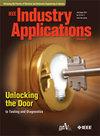Adaptive Control of Grid-Following Inverter-Based Resources Under Low Network Short Circuit Ratio
IF 4.2
2区 工程技术
Q2 ENGINEERING, ELECTRICAL & ELECTRONIC
引用次数: 0
Abstract
The stability and dynamic response of inverter-based resources are greatly influenced by uncertain grid parameters. The grid short circuit ratio (SCR) serves as a standard metric for assessing the strength of the network at any location within the electrical power network. A high SCR suggests a strong grid, whereas a low SCR indicates a fragile grid, more prone to disturbances and likely to affect the stability of grid-feeding inverters. Weak grids may lead to extended oscillatory periods in the injected currents at the point of common coupling and compromise the DC link voltage integrity. This research introduces a feedforward adaptive control scheme that operates alongside the current loop proportional-integral controllers, producing a compensating voltage to guarantee the dependable functioning of the voltage-oriented controlled inverters in extremely weak grid scenarios. The adaptive compensator is formulated on the basis of the deadbeat control principle and utilizes the information of the grid impedance to determine the feedforward voltage in real time. Comparative results demonstrate the effectiveness of this method in damping oscillations and shortening the settling time for the DC link voltage, active and reactive power in low SCR grids under transients and faults while minimizing the current total harmonic distortion. The proposed adaptive feedforward control strategy is also experimentally verified on a low voltage test rig under several dynamic conditions including transients, varying operating setpoints, and low voltage ride-through.求助全文
约1分钟内获得全文
求助全文
来源期刊

IEEE Transactions on Industry Applications
工程技术-工程:电子与电气
CiteScore
9.90
自引率
9.10%
发文量
747
审稿时长
3.3 months
期刊介绍:
The scope of the IEEE Transactions on Industry Applications includes all scope items of the IEEE Industry Applications Society, that is, the advancement of the theory and practice of electrical and electronic engineering in the development, design, manufacture, and application of electrical systems, apparatus, devices, and controls to the processes and equipment of industry and commerce; the promotion of safe, reliable, and economic installations; industry leadership in energy conservation and environmental, health, and safety issues; the creation of voluntary engineering standards and recommended practices; and the professional development of its membership.
 求助内容:
求助内容: 应助结果提醒方式:
应助结果提醒方式:


